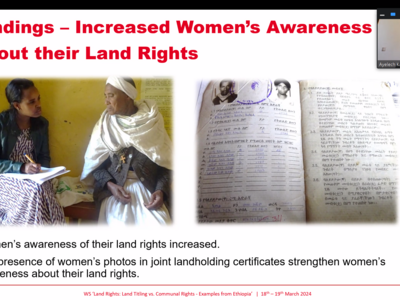

The workshop, which was held on 18 and 19 of March was organised by the RASFAS (Research and Strategies for Food and Agriculture Sustainability) project, funded by the Austrian Development Agency (ADA), and conducted in partnership with the Institute for Development Research (IDR) at BOKU University, Vienna. The workshop provided in-depth discussion on land titling and communal rights in Ethiopia, a critical issue affecting agricultural sustainability and rural livelihoods. The workshop involves a dialogue and knowledge exchange among researchers, policy makers, and practitioners, and aims to provide valuable insights and strategies for addressing land rights issues in Ethiopia and beyond.
Our former scholarship holder Dr. Ayelech Kidie was one of the speakers at the workshop, where she presented the results of her PhD research and introduced the KoEF project Rural Women's Right to Access to Land in North-West Ethiopia: Challenges and Limits (WA2Land) which she co-oordinated. The main objective of the workshop was to examine the situation of Ethiopian women after land registration programme.
On the first day of the workshop, she presented on the issue of “Ethiopian Women, and Land after the Implementation of Land Register Titling”. In this session, she emphasized the status of women’s access to land in developing countries in line with the global agenda, concepts on women and their land rights, the current status of Ethiopia and the situation of Ethiopian women after the land registration process (evidence from the Amhara region). In particular, she noted that in developing countries, rural women have limited access to productive resources due to the customary land tenure system and inappropriate policies. As a result, women are the disadvantaged group in terms of access to and control over land.
Similarly, Ethiopian women have historically had limited access to and control over land. Currently, the government is emphasizing gender equality and women’s land rights to address the past discrimination against women. Moreover, women equal land rights is constitutionalized which resulted in abolishing the previous discriminatory practices against women. More importantly, the government has launched the rural land registration programme since 1998. Her research findings show a great progress in women’s land rights after the land registration. Land administration institutions from the federal (higher) to the kebele (lower) level are well established and structured to implement land registration processes. The new land proclamations also contribute positively to the improvement of women's land rights. As a result, women’s access to land and tenure security and women’s wellbeing are improved after the implementation of the land registration program. Generally, land registration and/or formal land rights is a key to women’s access to land and to achieve sustainable development goals. Access to land resources is the basis for achieving many of the UN Sustainable Development Goals (SDGs), for instance, to achieve SDG 1 (addressing poverty), SDG 2 (addressing hunger, food security, nutrition, and sustainable agriculture), and SDG 5 (addressing gender equality, as well as the empowerment of women and girls).
On the second day of the workshop, she presented on the issue of “Gender Dynamics in Ethiopia Land Titling”. She highlighted gender dynamics in rural Ethiopia and the relevance and overall aim of the WA2Land project. This research project was funded by the OeAD Cooperation Development Research programme (KoEF) and it was an extension of her PhD research. The overall aim of this research project was to reduce gender inequalities and improve women's well-being in Northwest Ethiopia (SDG 5).
Dr. Ayelech’s previous research and the Wa2Land research projects shows that, despite the legal recognition and policy reform in Ethiopia today, rural women still face different challenges that limit their access to land. For instance, administrative problems (bureaucratic hurdles), negative ideologies/stereotypes of the local people, forceful taking of women’s land by men, violent grabbing of women’s land by their husbands at the time of divorce, pushing of women’s plot boundaries by male farmer, beating of women by men, sharecropping conflicts, land scarcity, etc. Therefore, the WA2Land research project which focused mainly on the legal recognition and practical application of rural women’s rights to access to land, was essential to improve women’s wellbeing and reduce gender inequality in access to land.
Dr. Ayelech Kidie Mengesha is now Assistant Professor at the Institute of Land Administration, Debre Markos University, Ethiopia, where she has been working since 2010. She received her Ph.D. 2022 from the University of Natural Resources and Life Sciences (BOKU), Austria under the supervision of Univ.Prof. Dr. Gernot Stöglehner, Assoc. Prof. Dr. Doris Damyanovic, Ass.Prof. Dr. Reinfried Mansberger (all three of them BOKU) and Ass.Prof.Dr. Sayeh Kassaw Agegnehu (Debre Markos University, Ethiopia). The PhD project was conducted within the APPEAR project EduLAND2, which aims to improve land administration education in Ethiopia and to improve the livelihoods of the local population. Since then, she has continued to cooperate with her former host institution. Ayelech holds two master degrees and one in Rural Development (Hawassa University, Ethiopia 2014) and one in Mountain Forestry (BOKU University, 2019). Ayelech was awarded the Inge Dirmhirn Prize 2019 by BOKU for her master's thesis: "Impact of rural land certification on household's decision to plant trees and women's rights to trees: in the case of Gozamen District in East Gojjam Zone, Ethiopia”.
Publications:
Mengesha, A. K., Mansberger, R., Damyanovic, D., Agegnehu, S. K., & Stoeglehner, G. (2022). The Contribution of Land Registration and Certification Program to Implement SDGs: The Case of the Amhara Region, Ethiopia. Land, 12(1), 93. https://doi.org/10.3390/land12010093
Mengesha, A. K., Bauer, T., Damyanovic, D., Agegnehu, S. K., Mansberger, R., & Stoeglehner, G. (2022). Gender Analysis of Landholding and Situation of Female-Headed Households after Land Registration: The Case of Machakel Woreda. Land, 11(7), 1029. https://doi.org/10.3390/land11071029
Mengesha, A. K., Damyanovic, D., Mansberger, R., Agegnehu, S. K., & Stoeglehner, G. (2021). Reducing gender inequalities through land titling? The case of Gozamin Woreda. World Development, 145, 105532. https://doi.org/10.1016/j.worlddev.2021.105532
Mengesha, A. K., Mansberger, R., Damyanovic, D., & Stoeglehner, G. (2019). Impact of Land Certification on Sustainable Land Use Practices: Case of Gozamin District, Ethiopia. Sustainability, 11(20), 5551. https://doi.org/10.3390/su11205551
